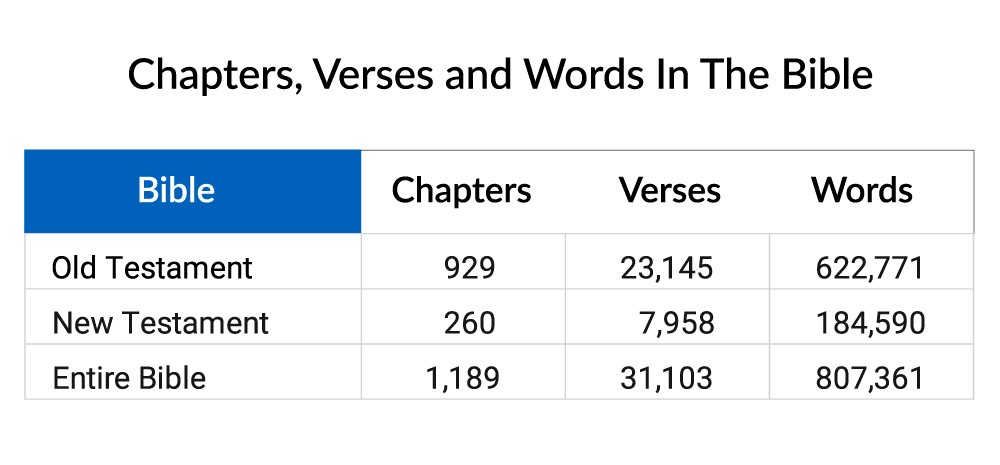Understanding the structure of the Bible is often the first step for anyone delving into its teachings and stories. A common question that arises is: How Many Chapters In The Bible are there? It’s a seemingly simple question, but the answer provides a foundational understanding of this complex and revered text. Let’s explore the chapter divisions within the Old and New Testaments to provide a clear and informative answer.
To begin, it’s helpful to recognize that the Bible isn’t just one book, but a collection of books. Specifically, most Protestant versions of the Bible contain 66 books in total, divided into two main sections: the Old Testament and the New Testament. While the number of books remains consistent across these versions, the precise count of verses and words can vary slightly depending on the translation. This is because translators interpret the original Hebrew, Aramaic, and Greek texts, and these interpretations can lead to minor differences in wording and verse divisions.
Breaking Down the Bible: Chapters and Verses
The division of the Bible into chapters and verses is a relatively recent development in its history. Originally, the texts were written more like continuous letters without these divisions. It was in the 13th century that chapters, as we know them today, were introduced to the Old Testament, and in the 16th century for the New Testament. These divisions were implemented to make navigating and referencing specific parts of the Bible easier.
So, how many chapters are we talking about? Across the entire Bible, there are a total of 1,189 chapters. This is broken down between the Old and New Testaments as follows:
- Old Testament: Contains 929 chapters.
- New Testament: Contains 260 chapters.
While these numbers are generally consistent, it’s worth noting that different Bible versions can sometimes have slight variations in verse counts, although the chapter count remains largely the same. For instance, some versions of the Bible might have a different number of verses in books like 3 John, but the chapter division will typically be consistent.
Chapter Count Across Bible Versions
As mentioned earlier, while the book and chapter count remains consistent in most Protestant Bibles, variations exist primarily in the number of verses and words. For example, the King James Version (KJV), New International Version (NIV), and Holman Christian Standard Bible (HCSB) have 14 verses in 3 John, while the New American Standard Bible (NASB), NET Bible, New Living Translation (NLT), and New Century Bible contain 15 verses.
For the purpose of providing specific figures, the numbers quoted in this article are based on the New American Standard Bible (NASB). This version is widely respected for its accuracy and close adherence to the original languages.
Old Testament Chapter Breakdown
The Old Testament, which recounts the history of Israel and lays the foundation for many Christian beliefs, is composed of 39 books and a significant portion of the Bible’s chapters. To reiterate, the Old Testament includes 929 chapters. These chapters are distributed across various books, from the lengthy books of the Law like Genesis and Exodus to the historical books, poetic books, and prophetic books.
New Testament Chapter Breakdown
The New Testament focuses on the life, teachings, death, and resurrection of Jesus Christ, as well as the early Christian church. Comprising 27 books, the New Testament is considerably shorter than the Old Testament in terms of chapter count. It contains a total of 260 chapters, which detail the Gospels, Acts of the Apostles, Epistles, and Revelation.
Interesting Bible Facts: Longest, Shortest, and Middle Chapters
Beyond the total chapter count, there are some fascinating facts about chapter lengths and positions within the Bible:
- Longest Chapter: Psalm 119 is renowned as the longest chapter in the Bible.
- Shortest Chapter: Psalm 117 is often cited as both the shortest and the middle chapter due to its positioning.
- Middle Chapter (Old Testament): Job 29 is considered the middle chapter of the Old Testament.
- Middle Chapter (New Testament): Romans 13 holds the position of the middle chapter in the New Testament.
- Middle Verse: Psalm 118:8 is often identified as the middle verse of the entire Bible.
Psalm 119’s length is particularly noteworthy. It is an acrostic psalm with 22 sections, each corresponding to a letter of the Hebrew alphabet. Each section contains eight verses, and every verse in a section begins with the same Hebrew letter. This intricate structure adds to the psalm’s unique character and depth.
Conclusion: A Structured Library of Faith
In summary, the Bible is structured into 1,189 chapters, divided between 929 chapters in the Old Testament and 260 chapters in the New Testament. While the number of verses and words can vary slightly across different translations, the chapter count remains a consistent framework for navigating this vast and influential text.
Despite being written by approximately 40 different authors over centuries, the Bible maintains a remarkable consistency and unified message, ultimately pointing to Jesus Christ. From prophecies to miracles, and teachings to the very nature of God, the Bible stands as a comprehensive and structured library of faith and spiritual guidance.
References:
- The Open Bible. New American Standard Bible. Thomas Nelson Publishers, 1977. p. 1227.
- Menahem Mansoor. Biblical Hebrew. Baker Book House. 1980. vol. 1. pp. 13-14.
Suggested Links:
- How many words are in the Greek New Testament?
- Chapters and Verses of the Bible – PDF
- Who divided the Bible into chapters and verses? Why was it divided?
- How Accurate Is the Bible?
- How is the Jewish Bible or Tanakh different from the Bible?
